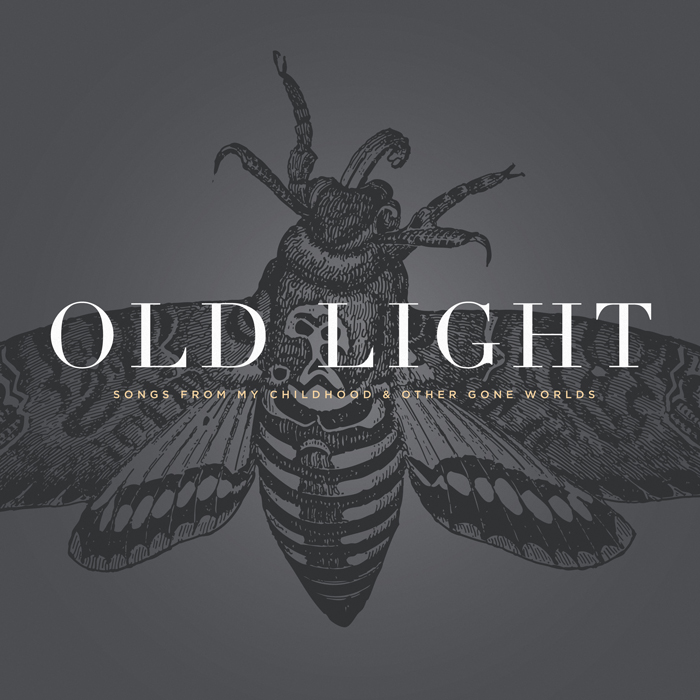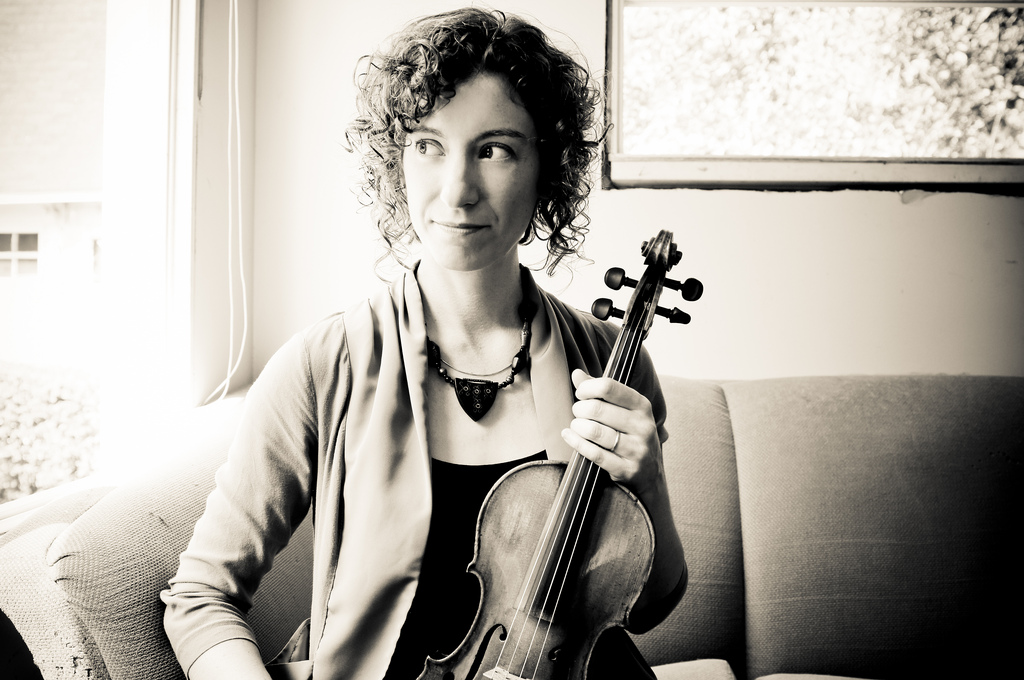Local fiddler Rayna Gellert (she’s recorded with artists like Robyn Hitchcock, Tyler Ramsey, Sara Watkins, Loudon Wainwright III and John Paul Jones) is about to release her solo debut album, Old Light: Songs From My Childhood & Other Gone Worlds. The record will be out, officially, on Tuesday, Oct. 2. But local fans get a sneak peek: Gellert plays a pre-release show at The Grey Eagle on Tuesday, Sept. 4. (8 p.m., $10 advance or $12 day of show.)
Gellert spoke to Xpress about the concept for the album, her foray into the world of the singer-songwriter, her ventures away from old-time music, and what happens when you mix a murder ballad with a Moog guitar.
Mountain Xpress: You moved to this area almost 20 years ago to go to Warren Wilson College. Is that where you got into playing old-time fiddle?
Ryana Gellert: I actually grew up with old-time music. My dad is an old-time fiddler and banjo player. I was already really, really into the music but I wasn’t actually playing it because I was too intimidated by my dad. I’d been playing classical music. When I moved down here was when I started to play [old-time], but I was already deeply into it.
MX: So it wasn’t that you took a Wayne Erbsen class. [Erbsen teaches Appalachian instruments like claw hammer banjo and mountain dulcimer at Warren Wilson.]
RG: I didn’t actually take any music classes here. Well, I did a couple of independent studies with Phil Jamison [coordinator of Warren Wilson’s Appalachian Music program] where he let me learn some fiddle tunes and some ballads.
MX: Is the connection to old-time music what’s kept you in this area?
RG: For a long time it definitely was. There’s a real strong sense of community around that music.
MX: As far as Old Light, is there a story behind the album?
RG: Yeah, kind of. I have two older brothers, and one of them has said to me a couple of times, “Why don’t you make an album of those creepy old songs that our parents sang to us when we were kids?” He was pushing me toward doing an album of murder ballads and sad songs, which is all stuff I really love, but I’ve never done a singing project. I think of myself much more an an instrumentalist. But there was something about him suggesting that to me that made me feel like, “Well, yeah, I feel a certain amount of ownership over some of this material because of having grown up with it.” Even though I don’t think of myself as a singer, I feel like I can sing those songs.
That’s kind of where it started, and then something strange happened. I started writing songs about memory and memory loss. Brain weirdness. I know someone who had a strange experience with amnesia. I was really moved by his writing about his experience with amnesia, and I wrote a couple of songs about that. I was also reading Musicophilia, an Oliver Sacks book about music and the brain, and then did some more reading about memory and how what we think of as our memory is not at all accurate. Just that concept of, basically, the songs I’m remembering from childhood and wanting to record, I’m filtering them through my memory and associating stuff with them. That’s unreliable. So I wound up combining the traditional songs and the original songs because I felt like they were all of a piece about the fragility of memory.

MX: You started out saying that your brother suggested you do these old songs that you grew up with. I noticed, when I was looking at the guests on these tracks, one of them was Alice Gerrard, whose music I grew up with. I was wondering, because she’s nearly 80 now, how you connected with her.
RG: It’s weird to think of how old she is, because she seems like she could not be more than 25. Her presence is so youthful. Because my parents play old-time music, I’ve been around that music my whole life as far as the scene. My dad [Dan Gellert] is a well-respected musician in that world so he knows some pretty bad-ass people. [Gerrard] is just part of the scene, so I’ve known her for a long time and I feel very close with her. She’s been a real friend and a real inspiration to me for a long time.
We’ve sung together if we’ve had time. Like, if we’re both teaching at a music camp, we’ll usually find time to sit down and sing a little bit together. She has so much emotion in her voice. I feel like something about her singing really affects me, and I just heard her voice on that song [“In the Ocean”]. She very sweetly agreed to do it.
MX: And Abigail Washburn is also a guest on your album. I know you’ve worked with her a lot in the past [they were in all-female old-time group Uncle Earl together].
RG: She’s been such an awesome cheerleader for me with this project.
MX: Something I feel that you and she have in common is that, while you’re both in this old-time world, you also both do really experimental things. Do you like to be in both worlds?
RG: Definitely. I feel like I’ve been going in all kinds of directions in the past several years. Even things like backing up Abby [Washburn] on her new stuff (I’ve done a decent amount of touring as a member of her band), and also playing with Scott Miller [with whom Gellert recently released the EP, CoDEPENDENTS]. Accompanying singer-songwriters has really been a cool experience for me, because that’s such a different thing than playing old-time fiddle tunes. I feel like that’s stretched me and made me think about songs differently, which is fun because I’m at the beginning of writing my own songs.
Listen to “1845,” with Miller on harmony vocal:
Playing with Toubab Krewe is just ridiculous fun. To play in a big, loud rock band with all those people is so powerful. I have so much freedom in that setting. They want me to do whatever. It’s always interesting for me to see what my particular skill set can bring to a situation like that. I tend toward pretty minimalist parts, and that works really well in that setting because there’s so much else going on and I can fill in the gaps. I get so much inspiration from all the different project I’ve gotten to be involved with.
MX: Drew Heller from Toubab Krewe is playing Moog guitar both on your album and for this tour. Tell me about that sound.
RG: Drew can describe technically how it works. It’s basically a lot of wacky electromagnetic shit going on. What it brings to the way we’ve been trying to figure out how to treat the songs for live performance — I feel like he is able to play the role of both electric guitar and keyboard. Not because he’s making keyboard sounds through a midi or something, but because he’s able to do this strange sustained stuff on the Moog guitar that he couldn’t do on a normal electric guitar.
Another really cool thing is that, as a fiddler, I’m very tuned into instrumental tones, and the Moog allows Drew to pull in and out different overtones and undertones like you would with drawbars on an organ. That’s been really satisfying to me, the way he can bring certain voicing on certain songs. And I think it’s fun to watch him manipulate this strange machine. Guitar geeks should come to the show just for that.
MX: What else can we expect at the Grey eagle show?
RG: A lot of depressing songs, murder ballads [laughs]. I’m going to sing a lot of songs and I’m not going to play very much fiddle. That’s a whole new world for me. I guess people can expect an unusual treatment of traditional songs, and a handful of originals as well. And I will have advanced copies of the CD.
Photo of Gellert by Jon Estes.




Before you comment
The comments section is here to provide a platform for civil dialogue on the issues we face together as a local community. Xpress is committed to offering this platform for all voices, but when the tone of the discussion gets nasty or strays off topic, we believe many people choose not to participate. Xpress editors are determined to moderate comments to ensure a constructive interchange is maintained. All comments judged not to be in keeping with the spirit of civil discourse will be removed and repeat violators will be banned. See here for our terms of service. Thank you for being part of this effort to promote respectful discussion.